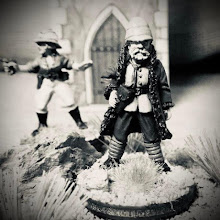Turn 4: The Franco-Bavarians. The Elector of Bavaria and his French counter-part launch local counterattacks to fend off the forces of the Grand Alliance. Careful positioning of the artillery provides much needed support as they slowly push back the Imperial army and all but decimate the Danish infantry.

The French Guard wave good-bye to the British Guards (far left unit with the white flag with the crimson cross of St. George with crown in the center)


Turn 5: "Who will recover my guns?" yells the French commander. Three batteries of abandoned guns were to my front. Prince Eugene's army had been stopped. The Anglo-Dutch cavalry had been repulsed and the English, Dutch and Scottish infantry had been given a bloody nose and appeared to be licking their wounds.
On my left, even though I had no cavalry, the French Infantry of that wing were strong and had taken charge of that part of the battlefield. They continued to advance, pushing back the Imperial Infantry and recapturing a battery of guns.

In the center left, the Bavarians, led by the Elector himself, push back the allied infantry to their front, causing a Dutch regiment to route - they could sense victory! The French on the right dressed their ranks a formed up for the advance - through murderous close-range musket fire they stormed the Anglo-Dutch line and yelled triumphantly as they witness the backs of redcoats retreating and nervous cavalry falling back. And then, as the smoke cleared, I realized that the line they enemy had retreated behind was stationary with muskets leveled . . .
Okay, so what's happening? Yes, the Bavarians and French were successful in their advance; however, they took too many loses and 2 Infantry Divisions (not real divisions as we define them today; more like a grouping of regiments) out of 3 were now each only one "hit" away from Division Exhaustion. Once a Division is exhausted, it cannot advance toward enemy troops; and, if it takes any more hits, it has the chance of Division collapse. When a Division collapses in Volley and Bayonet, all units are permanently disordered, any disordered units are routed, all routing units head to the tables edge - you get the picture. Though I was successful in my attack, my forces were so weak that they were in danger of collapse.
Speaking of collapse . . .
Turn 5: The Grand Alliance. "READY! AIM! FIRE! To make a long story short, the Bavarian Division morale collapses.


So what happened?
Plain and simple, I was out-generaled.
 The victorious Duke of Marlborough with the 1st Foot Guards and Royal Scots Fusiliers in front of him.
The victorious Duke of Marlborough with the 1st Foot Guards and Royal Scots Fusiliers in front of him.  Once I got my lines re-ordered, however, my infantry fought well. Looking back, I think I was too aggressive; instead of counter-attacking to grab the lost ground, I should have stayed stationary and taken advantage of the increased fire power to wear him down. Though my counterattack was successful, my army was too weak.
Once I got my lines re-ordered, however, my infantry fought well. Looking back, I think I was too aggressive; instead of counter-attacking to grab the lost ground, I should have stayed stationary and taken advantage of the increased fire power to wear him down. Though my counterattack was successful, my army was too weak. Prince Eugene moves up to link up with the Duke after the victory.
Prince Eugene moves up to link up with the Duke after the victory.All in all, a very exciting and fun game. We really enjoy the speed and feel of Volley and Bayonet. Unlike other rules, it does not get into "tactical" details of individual unit formations, etc.; this is a game that lets you be the army general.

The English enter Oberbratwurst . . . Schnitzel and beer for everyone!













































